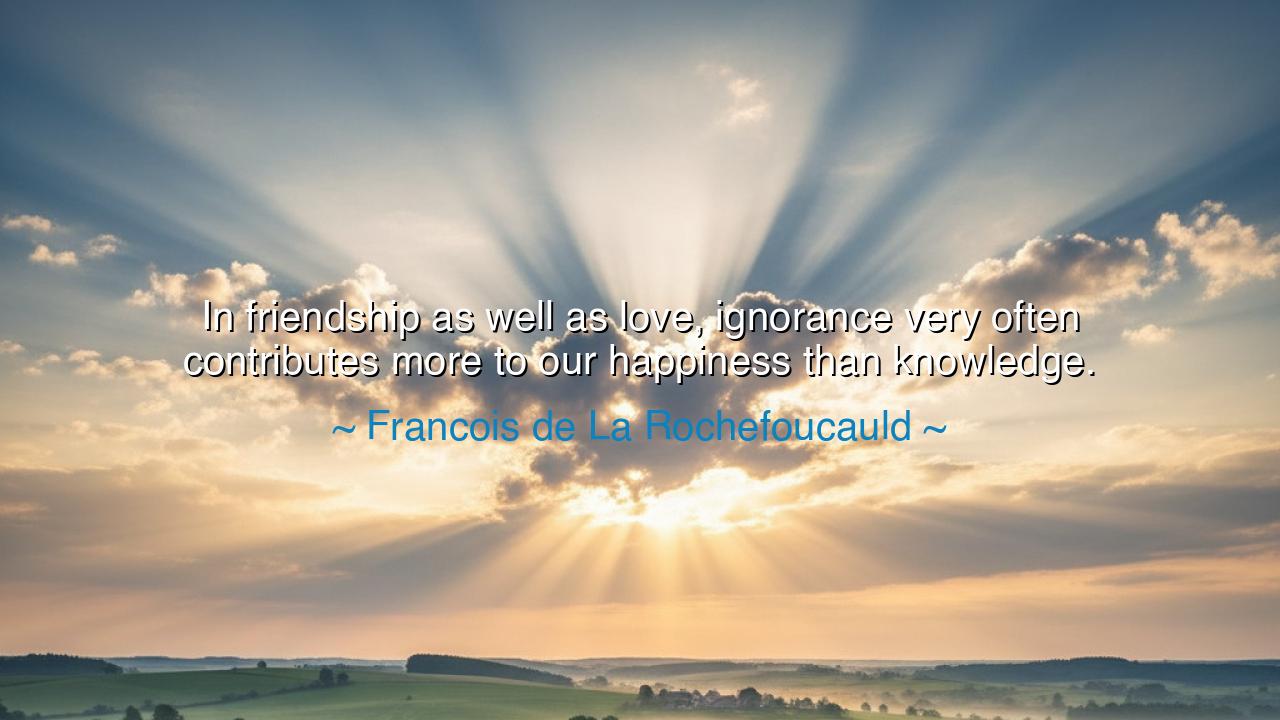
In friendship as well as love, ignorance very often contributes
In friendship as well as love, ignorance very often contributes more to our happiness than knowledge.






In the reflective and piercing words of François de La Rochefoucauld, the master of human insight, we encounter a truth both subtle and profound: “In friendship as well as love, ignorance very often contributes more to our happiness than knowledge.” This saying, born in the salons of seventeenth-century France, glows with the wisdom of one who had seen the fragile nature of the human heart. It reminds us that in both friendship and love, it is not always the sharp light of truth that nourishes joy, but sometimes the gentle shadow of unknowing — the grace to overlook, to forgive, to accept without questioning. For while knowledge can illuminate, it can also wound; and sometimes, to remain peacefully blind to small faults is wiser than to see all things clearly.
La Rochefoucauld lived among courtiers and nobles, where deceit and flattery mingled like perfume and smoke. He observed that the closer one looked into the hearts of others, the more vanity, jealousy, and frailty one found — yet those who saw too clearly often grew cold or bitter. His reflection, then, is not a rejection of wisdom but a plea for mercy. He teaches that perfect knowledge of another person — their every thought, weakness, and failure — may destroy the tenderness that binds us. Thus, in friendship and love, it is sometimes better to close the eyes of the mind, and open only the eyes of the heart.
There is an ancient echo of this truth in the story of King David and his son Absalom. Absalom betrayed his father, rising against him in pride and ambition. Yet when news of Absalom’s death reached David, the king wept not with rage, but with sorrow, crying, “O Absalom, my son, my son!” His grief was not born of knowledge — for knowledge would have justified hatred — but of love’s blindness, that holy ignorance which sees not the sin, but the child who once was good. This is the mystery La Rochefoucauld speaks of: that sometimes happiness, even holiness, lies in not knowing too much, in allowing compassion to veil what judgment would expose.
And what of friendship? The wise know that no friend is perfect. To remain at peace, one must often choose to ignore, not in denial, but in love. The great philosopher Montaigne, when speaking of his friendship with Étienne de La Boétie, said that their souls were “so mingled that one could not tell where one began and the other ended.” Yet even he knew that harmony survives only when one overlooks small differences. To know every hidden irritation, every secret flaw of a friend, would be to unravel the fabric of affection thread by thread. Ignorance, in such a case, is not folly; it is wisdom cloaked in gentleness.
La Rochefoucauld’s insight strikes against the modern hunger to know everything — to pry into motives, to dissect emotions, to demand absolute transparency. Yet he warns that total knowledge may be too heavy a burden for the heart. To love purely, we must sometimes love imperfectly — to see only what sustains affection, not what poisons it. Knowledge, when misused, can make us cynical; ignorance, when guided by love, can make us kind. The one who insists on seeing every truth may lose their capacity to forgive, while the one who allows some mysteries to remain unseen preserves the harmony that happiness requires.
There is, too, a quiet humility in this teaching. To accept that we do not, and cannot, know everything about those we love is to honor their mystery. Every soul contains shadows that even friendship cannot reach. To demand complete knowledge is to seek control; to accept partial ignorance is to give freedom. Thus, true love and friendship are built not upon perfect understanding, but upon trust — the belief that what we do not know will not destroy us, because the bond itself is strong enough to endure it.
So, O listener, take this lesson as a compass for your heart: seek not to know every secret, nor to expose every flaw. Let your curiosity be tempered by compassion, your honesty softened by mercy. When you love, let some things remain sacred, unseen, untouched by judgment. When you befriend, let forgiveness dwell where knowledge would condemn. For as La Rochefoucauld teaches, happiness is not found in knowing all, but in knowing enough — enough to cherish, to forgive, and to remain at peace.
In the end, the wise do not seek to see everything clearly, but to love deeply despite the blur. Remember: in friendship as in love, a little ignorance is not weakness — it is grace, the quiet art of seeing only what the heart was meant to see.






AAdministratorAdministrator
Welcome, honored guests. Please leave a comment, we will respond soon